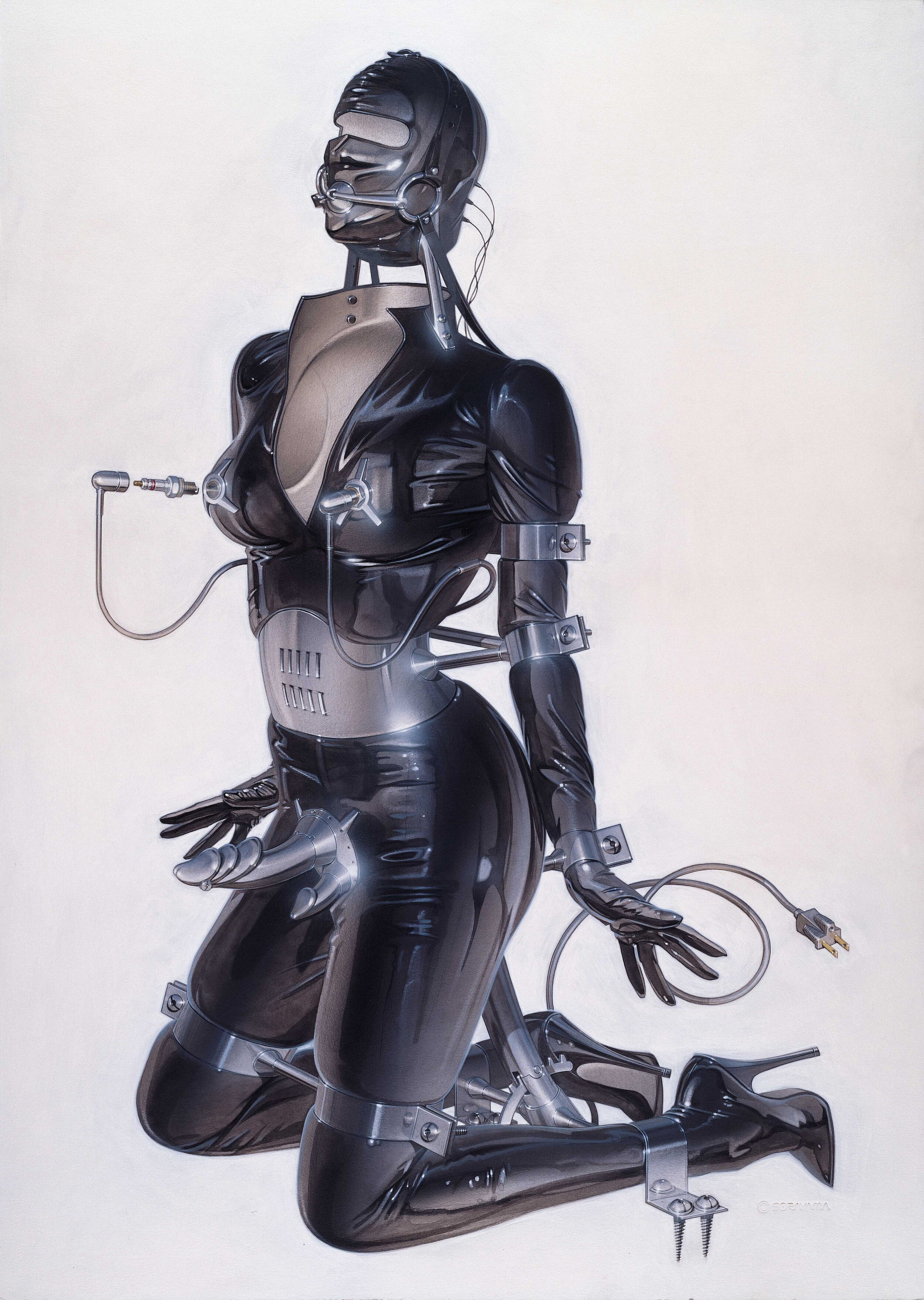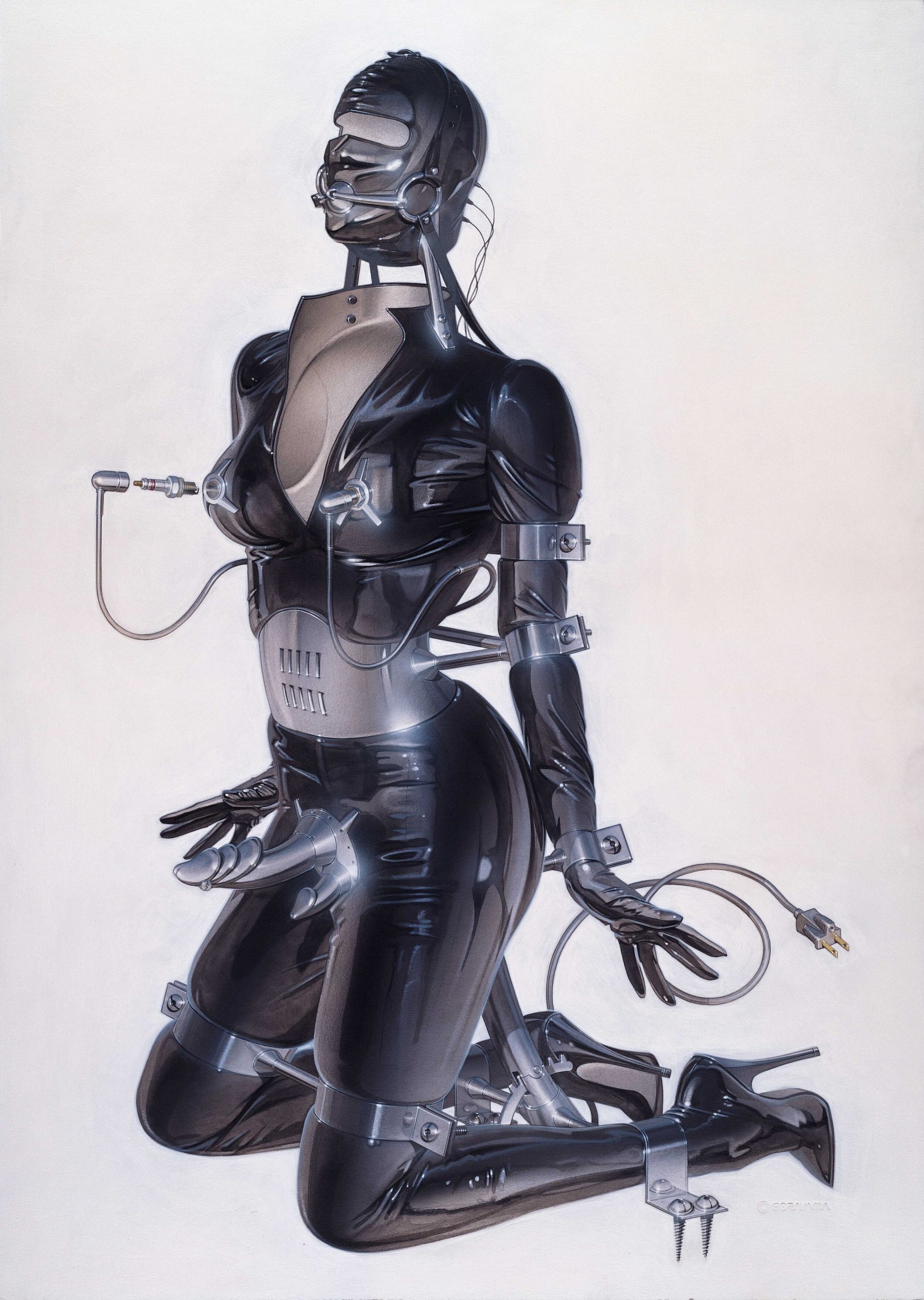
“The reason why other works are regarded as vulgar is because they lack love and ability”
“Ugh, I’m sick of dating apps.” A friend slams their phone down in disgust. “It would be so much easier if we could just get a robot boyfriend.” “A sexy robot,” I reply, laughing, but privately thinking that it sounds much easier than navigating Hinge. For Hajime Sorayama the concept of the ‘sexy robot’ is not merely a passing joke between friends but his life’s work. Most well known for his hyperrealistic illustrations of eroticised feminine robots, Sorayama describes his highly detailed style as ‘superrealism’ stating that he “deals with the technical issue of how close one can get to one’s object.”
As a kid, Soryama states that he was always picking up scraps of metal from the lathe factory and had a love of shiny things. “They say only crows and humans are awed by shiny things. That’s why I like to create reflectivity and transparency in my artwork. It’s easy to produce those effects in a video, but not on a flat surface.” He is quite open about his metal fetish stating that “Even Nobel winners are often people who nobody quite ‘gets.’ You should be proud to be an outsider.”
Influenced by the American pin-up girl Sorayama’s work explore’s taboo, fetishism, bondage and genetic manipulation by presenting images of unattainable idealised women and he has risen from cult fame to internationally recognised artist as a pioneer of the sci-fi erotica genre. His work extends far beyond the Japanese art scene and his influence can be seen in media ranging from Hollywood films to advertising, robotic dogs or dinosaurs and beyond. NR Magazine joins the artist in conversation.
What does identity mean to you as an artist?
I’ve been working as an artist for about 30 years, and I’ve always done what I like. I think that the style that you are comfortable with is what leads to your individuality, wouldn’t you agree?
Do you think viewers connect with your work because there is a collective desire for escapism in this post-capitalist society and people find the alien and uncanny comfortingly different?
I communicate with fans through my various works. That’s why I don’t give them titles. If you share the same values as I do, you can understand what I am trying to say by looking at the work and feeling it.
If people who feel stuck in the same societal norms don’t try to escape, I don’t think anything will change, whether it is capitalism or post-capitalism. If you don’t take action yourself, changing your environment won’t change your life either. This kind of goes back to the answer I gave to question one…
You have stated that you are not interested in the future yet your work imagines a future where women are no longer under the patriarchy and are viewed as goddesses. Have you also considered a future where robot x human and AI virtual relationships are a possibility?
I don’t think the future will come when humans and robots or AI will be on equal footing. It is self-evident that humans have the upper hand. The disparity between men and women is a different story. I don’t think it makes sense to make minor discriminations among the same species. We are all primates.
“I think there can be romantic feelings between humans and robots or AI. We also have lust and attachment to inorganic objects.”
Are there any sci-fi films or books that you are particularly drawn to or enjoy?
You may or may not have heard of a book by Junichiro Tanizaki. He authored a book about how close one’s fetish is to insanity. I also like “Blade Runner”. It’s about the love between a human and a machine. Beyond this, I also like the story of Pugmalion in Greek mythology, who became so fetishistic that he even had a child with a stone statue he created.
Do you think aesthetic cybernetic body modifications will become common in the near future? If you were to design body modifications what would you create?
First of all,
“I don’t think becoming a cyborg will become a common practice. This is because there is no such thing as something that everyone finds equally beautiful.”
People instinctively want to be popular in a wide and shallow range, so beauty that is specialized in one direction will never become common. I think there are people who might become cyborgs purely as a personal hobby. It’s a person’s personality that dictates whether they like it or not.
If I were to design a body modification, I don’t know what the person likes or if they enjoy it, thus I think they should do what they want.
One issue with creating ‘realistic’ robots is the ‘uncanny valley’ phenomenon. Is this something you considered when creating your sexy robots? Do you think robot designs in the future will be similar to your robots because of this?
The “uncanny valley” phenomenon occurs because of the lack of love in the motif. I think this is a problem that can be easily overcome with love and ability. Dolls and robots are just like dead bodies. I’m trying to breathe life into them. I think the robot of the future will not look like my robot. Each of us has our own fetishes.
You worked with SONY on the concept design for their robotic pet AIBO. Do you see yourself working in other robot designs in the future as technology advances?
I would like to try it. But I think I will be turned down. Because what I want to complete is not profitable. For example, just by looking at the first motif prepared by a company, I know the result. It’s not good, and I don’t want to do it.
There is something of an inside joke in the art community, particularly amongst illustrators, that if you learn how to draw fetish art you’ll never have to worry about money. You yourself have stated that you have a metal fetish and that is seen in your work. Why do you think your work is considered fine art while other similar art is considered lowbrow?
The reason why other works are regarded as vulgar is because they lack love and ability.
What advice do you have for young creatives looking to explore technology and eroticism in their work?
Do you like women? If it’s something you like, you can do it even if you die! Can you keep doing it for 30 or 40 years? I think it’s good if you like it that much.
Are you working on any projects at the moment and what plans do you have for the future?
It’s a secret. I’m working on something that will surprise everyone. I just hope the world will be okay with it.
Credits
Images · HAJIME SORAYAMA
www.sorayama.jp/
